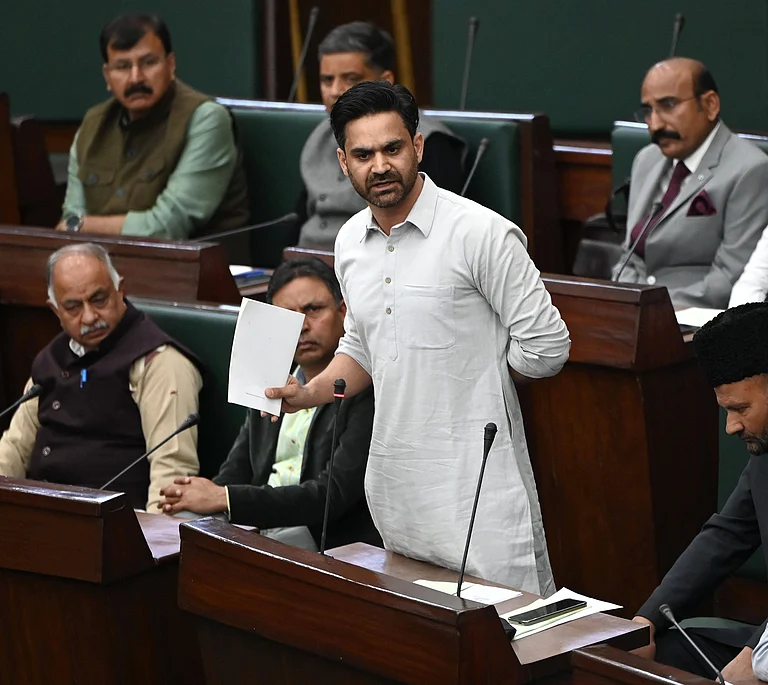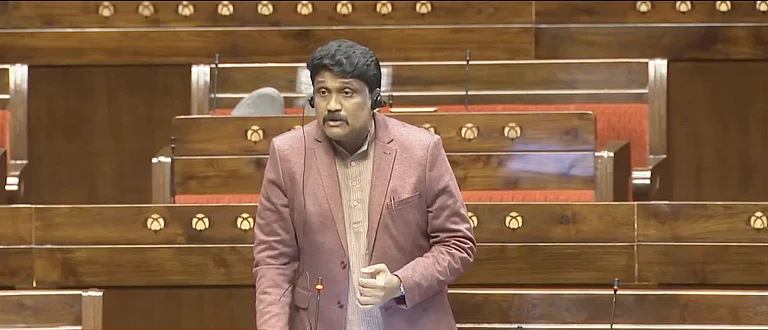Step By Step
- Wanted to study engineering, but did editing at FTII, Pune
- Acted in several FTII diploma films and some two dozen ads
- Counts Hrishikesh Mukherjee and Guru Dutt as his favourite directors and Anand and Pyaasa as his bible on filmmaking
- Has delivered three back-to-back hits: Munnabhai MBBS, Lage Raho Munnabhai
and now, 3i - Rs 114 cr is what 3i earned in just two weeks. It’s poised to be the biggest Bollywood blockbuster ever.
- $4.8 million (Rs 21.6 crore) is what the film grossed in the US in two weeks
***
On the last leg of a promotional tour, the team that made 3 Idiots (fashionably called 3i) is about to hit Nagpur, and no one is awaiting that encounter more eagerly than the film’s director. Nagpur is Rajkumar Hirani’s hometown, and he can’t wait to find out how “his people” have responded to the film. “I understand the city and its residents very well and want to hear them talk,” he says in a telephonic interview. Not just Nagpur, Hirani has proved beyond doubt that he understands the psyche of the middle classes across the country. From highlighting the need to humanise the medical profession in Munnabhai MBBS, to floating the catchy Gandhigiri mantra in Lage Raho Munnabhai and now, flying the flag of excellence over success in 3i, there is a weird and wonderful way his films connect with the man on the street. How else does one explain the 3i wave currently sweeping India?
3 Idiots is Hirani’s third hit in a row and looks set to become Bollywood’s biggest blockbuster ever. Actor Aamir Khan, till the other day basking in Ghajini glory, is quick to admit that 3i has equalled the business of Ghajini in just ten days, and may eventually do twice as well as Ghajini. Trade pundits have been equally quick to anoint hat-trick Hirani as Bollywood’s biggest director, but he clearly doesn’t care for the tag. “If tomorrow my films don’t work, they will pull me down,” he says, matter-of-factly.
Close friends emphasise in conversations that Hirani hasn’t changed after tasting success. Co-writer Abhijat Joshi, who fondly calls him ET, (“a talent from another planet”) points out that Hirani chose to host the 3i success party at an intimate club rather than a seven-star hotel. “He was unassuming enough to wait with me at the exit for 40 minutes till my car arrived,” he says. There is no arrogance or complacency about him yet, say others. “Even the quality of his shirts hasn’t changed. He hasn’t taken a leaf out of the Karan Johar book,” laughs Anupama Chopra, film critic and wife of filmmaker Vidhu Vinod Chopra. Hirani’s own wife, Manjeet, leads an unobtrusive life as a pilot with Indian Airlines.

Indeed, Hirani’s film sequences seem to be rooted in his own on-the-ground experiences. For instance, the 3i scene in which the character Chatur uses porn magazines to distract fellow students is based on an episode Hirani witnessed at a medical college in Nagpur. In more ways than one, the filmmaker’s own life mirrors those of his protagonists in 3i. Growing up in Nagpur, where his father ran a typing school, Hirani wanted to become an engineer but didn’t do well enough, and therefore opted to study commerce instead. Soon, the theatre bug bit him, and eventually he found himself at the Film and Television Institute of India (FTII), Pune, learning editing.
“I didn’t even know what editing meant when I started out,” he confesses. But today, his editing background is his biggest strength as a director. “I edit as I write and shoot. Any extra line, any pause that I know will get chopped on the editing table is done away with then and there,” he explains. Spending time in the editing room is what he enjoys the most in the entire process of filmmaking. “I can lock myself for months in the editing suite with no noise or distractions. It’s fascinating to see the film taking shape,” he says.
The days at FTII created bonds that only grew stronger with time. Filmmaker Sriram Raghavan (Ek Haseena Thi, Johnny Gaddar) was his batchmate and Hirani edited his diploma film. It was at Raghavan’s house that Hirani set up base when he moved to Mumbai. Cameraman C.K. Muralidharan and sound designer Bishwadeep Chatterjee are other batchmates and close friends who have been part of his crew. “We had no godfathers, contacts or families in Mumbai. We were a support system for each other,” recollects Chatterjee.
After graduating from FTII, Hirani worked in advertising, acted in a few ads and even set up his own agency. An editing assignment for Mission Kashmir brought him in contact with director Vidhu Vinod Chopra. Even though the quiet Hirani is poles apart from the volatile Chopra, the two have stuck together since, as have other members of that team. “Filmmaking is not a profession but a passion for us,” says Hirani. “It’s about bringing out the best in each other,” says Chatterjee.
Unlike other FTII graduates who might speak of Fellini and Antonioni as their inspiration, Hirani lists Hrishikesh Mukherjee and Guru Dutt and Anand and Pyaasa as his favourites. “I like human-interest movies that are light-hearted,” he says. At a time when modern Bollywood cinema is all about being dark, edgy and convoluted, Hirani is simplicity and sunshine. His story-telling is old-fashioned. “It’s emotional cinema, in which there is nothing plastic. At a time when emotional connectivity is getting lost, Hirani is still able to communicate with all levels of people,” says Muralidharan.
Simple, straightforward and uncomplicated they might be, but Hirani’s films have a strong philosophical-humanitarian core. His heroes are like Shakesperean fools, on the margins but with an innate understanding of life. The moral pills are sugar-coated, and therefore not hard to digest. There is such a strong strain of good humour and goodness running through the films that there are no conventional villains. Even characters with negative traits are dealt with affectionately. The films are permeated with a “chicken soup” warmth, with a jaadu ki jhappi (magical hug) or “all ij well” chant as a cure-all. No wonder Aamir calls Hirani the Frank Capra of Bollywood.
Those who know him feel his cinema reflects the kind of man he is. “He has no pretences. You get what you see. I can’t think of any negative quality in him,” says Aamir. Set against that testimonial, the Chetan Bhagat controversy seems hard to believe, and jarring. Could a man like Hirani have been be the villain in that piece? He declines to comment, having said his last word on the issue on a YouTube testimonial. He would much rather focus on his next film, which he promises will be a “light-hearted, human-interest film”. Another sugar-coated moral pill to chew on, and get addicted to.
Sriram Raghavan, the director of Ek Haseena Thi and Johnny Gaddar, who was Rajkumar Hirani's batchmate at the FTII, adds a comment that was received after the above piece had gone to press; it therefore appears only on web:
Raju and I were in the same batch in the FTII. We were in the same unit and he edited my diploma film The Eight Column Affair, which won a National Award for Best Short Fiction.
We got along because of a love for mainstream Hindi films. At that time, in the FTII it was almost a sin to love Hindi films. But we bonded on the films of Vijay Anand, Manmohan Desai, Hrishikesh Mukherjee, Ramesh Sippy and Raj Kapoor. And many others.
His best quality as an editor is that he would never crib about the material being not so good. In fact, he would attack it with more enthusiasm. He has extraordinary patience at the edit table and he's also very fast.
Raju is a gem of a person but he's also a prankster. He has a great sense of humour. Many incidents in 3 Idiots actually happened whilst we were in the Institute. There was a student who had a bath in the main garden with a hosepipe when there was no water in the hostel.
Once we graduated from the FTII, most of us landed up in Mumbai where I had a flat without a phone. He stayed there for a few months. Every morning we used to go to a payphone and make calls for work. Raju edited a whole lot of ads, TV serials....and it didn't matter if the material was good or great or bad. He would do his best and improve it for sure. If he is editing something, you know you are in good hands.
I love his films. He can make you laugh and cry in the same scene. And he has the rare ability to connect with every cross section of audience. His films are pure Hindi films: Very enjoyable and yet they have something to say.






















